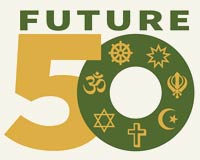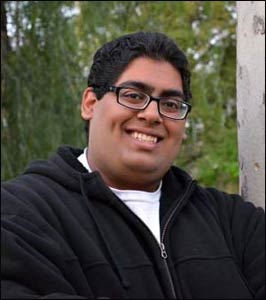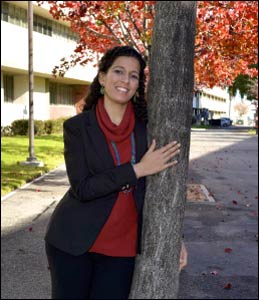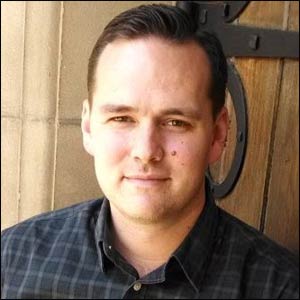By Lia Mandelbaum
FUTURE 50: PASSING THE TORCH
A simple discussion several years ago about how to celebrate the 45th anniversary of the Interreligious Council of Southern California‘s (IRC) led to exploring the importance of fostering stronger relationships and bridging the gap between the older and rising generations of faith-inspired leaders. It turned out these members of the IRC and the Center for Religion and Civic Culture (CRCC) at the University of Southern California had touched on a growing concern.
Interreligious Council of Southern California (IRC) members gather in front of King Fahad Mosque in Culver City. – Photo: irc-sc.org
Founded in 1969, the IRC is an exceptional model of interreligious cooperation and collaboration, with a council of delegates who represent the world’s major religions. Over the years, a beautiful and natural partnership has grown between the IRC and CRCC. Named a Pew Center of Excellence in 2002, the CRCC was founded in 1996 to create, translate, and disseminate scholarship on the civic role of religion.
During that early conversation, Brie Loskota, managing director of CRCC, was interested in discussing what the Interreligious Council has learned in 45 years, what they want to pass on, and what IRC will look like going forward. The primary learning is that religious communities and leadership are undergoing radical change. As Loskota observes, “People do not relate to their denominations or religious structures as they used to, and interreligiousity has been much more infused in the current generation as a social norm than when the IRC was first started.”
That day they also discussed the importance of learning from the work being done now by the younger generations of faith-inspired leaders in Los Angeles.
Birth of a Leadership Community

Hence the Future50 was created, an initiative forged by the CRCC, in partnership with IRC, seeking to uncover, highlight, and provide support for the rising generation of leaders, inspired by their faith, who are committed to IRC’s core values.
In the spring of 2014, Future50 gathered applications from young adults between the ages of 24-35, involved in religious life in Los Angeles. It sought leaders committed to religious pluralism and the value of civility. A cohort of 50 rising leaders was selected from the applications submitted, with an emphasis on diversity. The group includes a hip-hop artist, a sign-language specialist, clergy, activists, NGO executives and trustees, human service providers, and more. The cohort includes 26 men and 24 women, coming from 12 different faiths and 12 different ethnicities. Future50 posted a profile of their impressive backgrounds in a recent report.
A core goal is that members of the cohort develop meaningful relationships and collaborate with each other as well as with IRC trustees.
“Brie wisely said that civil discourse is something best modeled and lived out rather then prescribed, and it was her brainstorm that led to the genesis of the Future50 initiative,” said Bob Williams, IRC vice president, representing the Episcopal Diocese of Los Angeles. “The IRC sees this initiative as an exchange of gifts, where Council members are learning from the Future50. And it is our hope that Future50 members will find something of value to learn from current IRC members, most of whom are middle age.” Regardless of the generational differences and varying religious practices, there is a common goal across the board: a yearning and striving for a better world, however that plays out differently from group to group.
“In Future50, the majority of the leaders are working in spheres where religion and the world intersect that is not congregational. They are finding other ways to integrate their religious, political, and social lives into something they find meaningful,” Brie Loskota says. This sort of dynamism and flow can create a sense of wholeness, rather than compartmentalization, which often happens within congregations and denominations. With this being said, there is also the importance of having respect for what has come before us.”
How do the participants of the Future50 cohort feel about this grand task?

“The way I see it, our new generations of faith leaders are contributing to an emerging dynamic which balances worldview and service through the notion of a global ethic: From all the perspectives that we come from, we share a common ground that allows recognition and respect for the diversity in our humanity. At the same time, though, it uses concepts such as compassion and empathy to build bridges between individuals and communities, while demonstrating that the struggle we experience in this realitycan be resolved through the relationships we foster and the movements we create to bring positive change. A collaboration between a Hindu, a Muslim, and an atheist is possible when they all agree on the value of charity and social justice, rather than only focusing on differences of theology and dogma.” ~ Tahil Sharma, United Nations Youth Representative

“For leaders like myself, I cannot take anything for granted as I embrace differences with curiosity. Shared interests, practices, aspirations, and values versus being defined by proximity or identities of religion, ethnicity, culture, class, or even family define my community. With such interactions, I, as a leader, have to take on a more holistic and inclusive approach so as to focus on areas for collaborations and enrichment through our diversity. I am still grounded in my religious values and faith but see them reaching beyond the Muslim community.” ~ Tasneem Farah Noor, CEO/Life Coach for Noor Enterprises: SOULful Transformation

“I think Millennials (roughly 35 and under) like me are a complicated bunch. On the one hand, we write off tradition and blaze our own trail. On the other, in my tradition – Christianity – there is a real trend toward embracing the liturgical and traditional modes of worship. It seems that we have experienced the negative effects of sectarianism among the denominational divides and the animosity they have wrought, and yet simultaneously we are longing for deep roots in a tradition that can instill purpose. I think this is why ecumenism is such a draw for younger Christians: It allows us to appropriately respect each other’s tradition while still embedding ourselves in a ‘home’ where we can find a stable community.” ~ Steve Smith, Director of Admissions at Fuller Theological Seminary
The dialogues sparked by the initiative are a significant piece of the project.
“As we began to discuss the project among IRC members, some mentioned that their view of leadership was different than the more typical or stereotypical views of leadership, so there was much discussion about the different models,” Bob Williams reports.
During the most recent meeting of the IRC, the simple task of filling out a nametag sparked a discussion between members and the Future50 cohort about identity, changing trends, and “labels” being spiritual versus religious. The older members had listed their names and religious association on their nametags, whereas the younger members either listed their name or listed the organization/institute they represented.
From nametags to anniversaries, this dialogue will be a part of interfaith conversation in Los Angeles as the torch gets passed.


